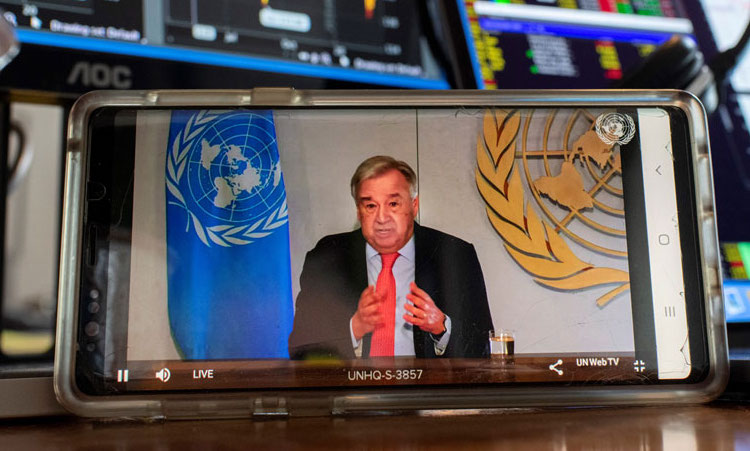By Daniel Johnson of UN News
GENEVA (IDN) – The impact of the ongoing COVID-19 pandemic on the elderly, the world’s poorest, and the asylum seekers as well as the ways and means of addressing the after-effects are some major priorities of the United Nations.
Abandoning elderly at risk from coronavirus is ‘criminal’, the UN human rights office, OHCHR, has said. The rights of all people and particularly the elderly and infirm need to be respected at a time of crisis such as the ongoing pandemic, the OHCHR said, amid concern that some countries are doing too little to look after their senior citizens.
Speaking via video conference in Geneva, Rupert Colville from the Office for the High Commissioner of Human Rights, said: “Well, they’re in an extremely difficult position and it’s essential that the authorities – and I think very much that this is where community groups, human rights institutions, NGOs and so on play an absolutely vital role in flagging where these people are living…are getting the help they need and are not abandoned. And yes, it’s absolutely criminal to abandon somebody who’s infirm, helpless unable to move and so on.”
Mr Colville noted that many Governments had shown it was possible to support the vulnerable and that these “good practices” should be shared elsewhere. These measures include halting evictions, putting disused housing to use, and deferring mortgage payments on hold for people who would otherwise have nowhere to go if they were made homeless.
Asylum-seekers‘ concern
Meanwhile, the UN refugee agency has said that it is looking to scale up assistance to camps and host communities as the COVID-19 pandemic closes in. From Asia to Latin America, wherever there is a critical refugee situation, people are worried about staying safe, UNHCR‘s Andrej Mahecic said in Geneva:
“There is a lot of concern about this among the displaced people because often they live in situations where there is little opportunity for preventive measures, there is very little possibilities for social distancing, for basic hygiene and these are the area where the current preventive measures are being taken….we have a presence in 134 countries and as I said the focus is on developing nations where 80 per cent of refugees are hosted by those countries.”
The agency is calling on all Governments to consider the needs of refugees and the displaced when putting in place COVID-19 plans. It appealed for $250 million to boost refugee protection against the new coronavirus as part of a UN Global humanitarian appeal.
A ‘social bomb‘ could explode
Francesco Rocca, President of the Red Cross and Red Crescent Societies (IFRC), who visited the hardest-hit locations in the northern Italian region of Lombardy, said on March 27 that a lack of available staff has resulted in physiotherapists processing dead patients, and heart surgeons “working in the war“ against the coronavirus, instead of carrying out other lifesaving operations.
Speaking via video conference, Mr Rocca warned of “a social bomb” which could explode at any moment, as there were plenty of people whose daily subsistence wages are threatened by the crisis and who have no welfare protection:
“We have a lot of people who are living very marginalized in the so-called black hole of the society with daily jobs, or other ways to live. In the most difficult neighborhood of the biggest cities I am afraid that in a few weeks we will have social problems, this is a social bomb that can explode in every moment,” Mr Rocca said.
He added: “Because they don’t have any way to have an income, or to find an income. People that normally live with 20 – 25 Euros per day, with these little jobs on a daily basis, and maybe they have two children or a family, and they have no income in this moment.”
To help the world’s most vulnerable communities to face the pandemic, the IFRC has launched a revised $825 million appeal.
‘Double-digit‘ percentage of global GDP needed
Also, UN Secretary-General António Guterres has emphasized that massive investment in the trillions of dollars is needed from the world’s richest nations to keep economies “afloat” in the face of the COVID-19 pandemic.
Ahead of the video conference of the Group of 20 major industrialized nations, hosted by Saudi Arabia, Mr Guterres on March 26 launched a $2 billion global humanitarian response plan to help those most at risk from the coronavirus outbreak. And this against the backdrop that more than 450,000 people worldwide have been infected and more than 20,000 have died, to date.
In an interview with Euronews, the UN Chief called for countries to take more aggressive action against the spread of the virus, by testing potential cases, tracing contacts of patients and enforcing strict lockdowns where necessary.
“We need to break” the rising curve of infections, he said, and mobilise a double-digit percentage of the global economy to create one that is more inclusive and sustainable in future.
Developed countries should act in a more coordinated way to support people and businesses, Mr. Guterres said, before calling for around $2.5 to $3 trillion dollars from G20 States to help developing countries do the same.
The fund will focus on South America, Africa, the Middle East and Asia, as well as boost efforts to stop the virus from circling back around the globe later in the year.
UN agencies will be in the lead, along with NGOs and partners to deliver testing equipment, provide sanitation facilities, drive communication and awareness campaigns and create airbridges for humanitarian workers. [IDN-InDepthNews – 02 April 2020]
Photo: Secretary-General António Guterres briefs the media on the socio-economic impacts of the COVID-19 pandemic. UN Photo/Mark Garten
IDN is flagship agency of the International Press Syndicate.
facebook.com/IDN.GoingDeeper – twitter.com/InDepthNews
Take care. Stay safe in time of Corona.

